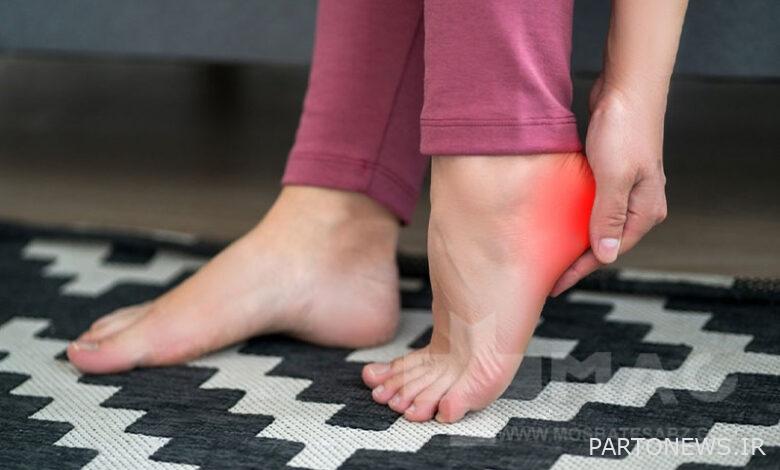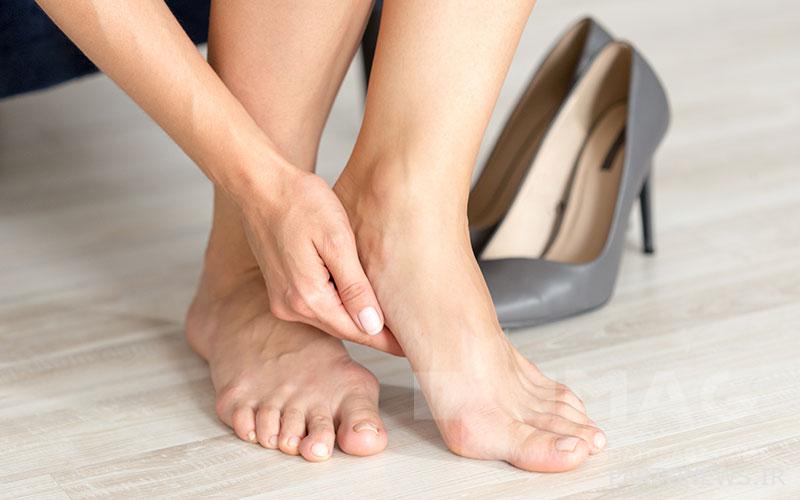Lack of this vitamin causes heel pain

Maybe the title of this article seems a little strange to you. Yes; Vitamin deficiency can even be effective in heel pain. Of course, there are many different factors behind why your heel hurts! For example, a simple reason is that you have been wearing high heels for a long time. The topic we discuss in this article is vitamin deficiency and heel pain, but we will also mention other influencing factors.
What we read in this article
vitamin deficiency and heel pain; Vitamin D
Pain in all joints and muscles is closely related to vitamin D deficiency. Deficiency of this vitamin leads to muscle weakness and will cause pain in some parts of the body, including the heel. You need enough calcium in your body to avoid muscle pain. What increases the absorption of calcium in the body is vitamin D. When you are deficient in vitamin D, you may also be deficient in calcium.
So the cause of heel pain can be related to vitamin D deficiency. In order for vitamin D to increase in your body and its deficiency does not cause pain in your joints, bones and muscles, you must have enough sources of vitamin D. As you must know, high amounts of vitamin D are produced in the human body by exposure to sunlight. But the problem is that most people don’t get enough sunlight.
Therefore, vitamin D deficiency is one of the most common vitamin deficiencies in the body of children and adults. To get this vitamin from your food sources, eat enough fish and fortified dairy products. However, when the deficiency is severe, there is no other option but to take vitamin D tablets. The price of vitamin D tablets varies depending on the quantity in the package as well as the manufacturer. Have you recently had a blood test to find out if you have a vitamin D deficiency?
The role of vitamin B12 in heel pain
Do you know what plantar fascia is? The plantar fascia is a thick, web-like ligament that connects the heel to the lower leg. This ligament contributes to the necessary ability to create a foot arch and plays an effective role in walking. But it is interesting to know that vitamin B12 deficiency can lead to worsening of plantar fasciitis.
Also, another point here is that vitamin B12 is needed for the nervous system to function well in the body. When the nerves in the foot are damaged, the resulting pain may also be transmitted to the heel. So when we talk about vitamin deficiency and heel pain, we should not forget vitamin B12. This vitamin also plays an important role in hematopoiesis.
Rich sources of vitamin B12 include: red meat, sardines, tuna, salmon, eggs and milk. By buying vitamin B12 tablets, you can prevent muscle pains and have more energy by increasing blood production in the body.
Which vitamin deficiency causes heel pain? Vitamin B6
Apart from vitamin B12, other group B vitamins such as vitamin B6 are also effective in heel pain. Vitamin B6 is needed to make red blood cells that carry oxygen throughout the body and help you have the energy you need to carry out your daily activities. On the other hand, pain in the hands and feet can be caused by nerve damage caused by vitamin B6 deficiency in the human body.
So another cause of heel pain may be vitamin B6 deficiency. Of course, it is worth noting that excessive consumption of this vitamin is not ineffective in causing heel pain and other muscles and joints of the body. So, if you are taking vitamin B6 pills, be sure to consult your doctor about its dosage. Vitamin B6 is abundantly found in fish, chicken and red meat.

Does calcium deficiency cause heel pain?
Although calcium is not a vitamin and is considered a mineral, but when we talk about vitamin deficiency and heel pain, it is necessary to mention this nutrient as well. Everyone needs adequate levels of calcium in their bodies to maintain healthy bones. Calcium deficiency causes bone and joint pain and muscle cramps.
Lack of this mineral can also affect heel pain. The more severe the lack of calcium in the body, the more likely it is to cause pain in the leg area. Do you use enough dairy in your diet? Find out if your heel pain is related to a calcium deficiency with a blood test. Calcium tablets can be the best option for treating severe calcium deficiency.
Magnesium deficiency and heel pain
Do not underestimate magnesium deficiency. This mineral can play an important role in preventing joint, bone and muscle pain. If you’ve recently been experiencing heel pain for no apparent reason, you may be deficient in magnesium. Magnesium helps in better absorption of calcium in the body. If you think you have magnesium deficiency, consult your doctor and buy magnesium tablets from the pharmacy.
We suggest that you always include foods rich in magnesium in your diet. Do you know these foods? The best sources of magnesium for the body are dark chocolate, avocados, nuts, legumes, seeds, whole grains, fatty fish, bananas, and dark green leafy vegetables such as spinach.
Plantar fasciitis and vitamin C deficiency
In the topic of vitamin deficiency and heel pain, we should also mention vitamin C deficiency. In the previous parts of the article, we mentioned the plantar fascia. Vitamin C has a strong anti-inflammatory effect and reduces the pain caused by plantar fascia. In addition, vitamin C also plays a role in calcium absorption. One of the causes of plantar fascia can be heel spurs, which vitamin C reduces.
To reduce inflammation caused by plantar fasciitis, it is better to take vitamin C tablets. Citrus fruits, bell peppers, broccoli and strawberries are also rich sources of vitamin C. This vitamin is soluble in water and its excess is usually easily removed from the body. However, you should not overdo it.

Cause of heel pain
Other causes of heel pain are as follows:
- Leg muscle weakness due to inactivity
- Very long walks, especially on rough roads
- Arthritis (wear and tear of the ankle joint)
- Achilles tendonitis (swelling of the muscle in the ball of the foot)
- Nerve compression in the leg
- who is
- Narrowing of the blood vessels of the heel
- Sever’s disease
- Blister
- Intense physical activity
- bursitis
- Abnormal bone growth at the back of the heel
- Long standing
- tumor
- Long-term use of high-heeled or inappropriate shoes
If heel pain lasts more than 1 week, it is better to consult an orthopedic doctor for better treatment. Thank you for being with us in this article from Positive Green Online Pharmacy magazine.

